Seismic Evaluation and Rehabilitation of Steel Structures in the United States

|
|
|||||||||||
Bibliografische Angaben
| Autor(en): |
Roberto T. leon
(Virginia Tech, Blacksburg, VA, USA)
Jay Harris (National Institute of Standards and Technology, Gaithersburg, MD, USA) Conrad Paulson (Wyss, Janney & Elstner, Pasadena, CA, USA) |
||||
|---|---|---|---|---|---|
| Medium: | Tagungsbeitrag | ||||
| Sprache(n): | Englisch | ||||
| Tagung: | IABSE Symposium: Construction’s Role for a World in Emergency, Manchester, United Kingdom, 10-14 April 2024 | ||||
| Veröffentlicht in: | IABSE Symposium Manchester 2024 | ||||
|
|||||
| Seite(n): | 690-697 | ||||
| Anzahl der Seiten (im PDF): | 8 | ||||
| DOI: | 10.2749/manchester.2024.0690 | ||||
| Abstrakt: |
The USA has a very significant stock of existing steel buildings that were built before modern design provisions were incorporated into design codes for seismic and hurricane actions. Until about 10 years ago, evaluation and retrofit of structures were based on two documents: (1) ASCE 31 Seismic Evaluation of Existing Buildings, and (2) ASCE 41 Seismic Rehabilitation of Existing Buildings. Over the past decade, efforts have been made to (1) unify the evaluation and retrofit processes into a single document, with the ASCE 41 edition from 2017 mostly completing this task; and, (2) separating loading requirements, to be kept within a new ASCE 41, and material‐specific evaluation/retrofit provisions, to be developed for different construction materials by professional associations. As a result, AISC has recently published ANSI/AISC 342‐22 Seismic Provisions for Evaluation and Retrofit of Existing Structural Steel Buildings to supplement the 2023 edition of ASCE 41. This document applies to metal buildings, particularly steel ones but includes composite, cast iron, and wrought iron elements. To aid in this task, a new edition of the AISC Design Guide 15: Assessment and Repair of Structural Steel in Existing Buildings will be published soon. The paper and presentation will first give some context for the development of the Provisions, and then discuss significant changes, including, to name a few: (1) updates to the condition assessment process and its testing requirement; (2) conditions under which default material properties can be used; (3) factors for expected material yield/ultimate strength for different eras; (4) definitions of simplified force‐deformation curves for force‐ and deformation‐controlled elements; and (5) performance‐ based design parameters. |
||||
| Stichwörter: |
Erdbebenbemessung Instandsetzung Altbauten
|
||||
